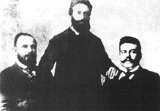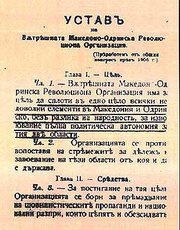Goce Delchev
|
|
| Contents |
Biography
Gotse_Delchev.png
Goce.grob.jpg
Goce.prijateli.small.jpg
Goce Delčev (Гоце Делчев, also transliterated Gotze Delchev and Gotse Delchev; 1872-1903) was a 19th century revolutionary. He was the leader of the Internal Macedonian-Adrianople Revolutionary Organisation (IMARO)1 that was active in Ottoman Macedonia and Thrace at the end of the 19th and the beginning of the 20th century.
Born on January 23, 1872 in Kukush (now Kilkis, nothern Greece), Delcev finished the local junior high school and the Bulgarian high school "St Cyril and Methodius" in Thessaloniki. He entered the Military academy in Sofia in 1891 but was expelled because he was a member of a socialist circle. Delchev became a teacher in a Bulgarian school in Stip in 1894, where he met Dame Gruev, the leader of the local committee of IMARO. As a result of the close friendship between the two, Delchev joined the organization in 1895 becoming before long its leader. Goce Delchev's involvement in IMARO was an important momnet for the history of the Macedonian liberation movement. The years between 1894 and 1903 represented the final and most effective revolutionary phase of his short life.
Delchev fought for Macedonian autonomy. As most of the other leaders of IMARO at the time, Delcev had a vision of a multiethnic and self-governing Macedonia. The international, cosmopolitan views of Delchev that elevated him far ahead of his time, could be summarized in his proverbial sentence: "I understand the world solely as a field for cultural competition among nations".
His correspondence with the other IMARO members covers extensive data on supplies, transport and storage of weapons and ammunition in Macedonia. Delchev initiated the idea for an independent production of weapons, which resulted in the establishment of a bomb manufacturing plant in the village of Sabler near Kyustendil in Bulgaria. The bombs were later smuggled across the Ottoman border into Macedonia.
The inclusion of the rural areas into the organizational districts contributed to the expansion of the organization and the increase in its membership, while providing the essential prerequisites for the formation of the military power of the organization, at the same time having Goce Delchev as its military advisor (inspector). Delchev's work-style defied the discrepancy between words and deeds.
The primary question regarding the timing of the uprising in Macedonia implicated an apparent discordance among the representatives, at the Sofia Conference in 1903 with Delchev opposing the uprising as premature.
Delcev died on May 4, 1903 in a skirmish with the Turkish police near the village of Banitza, located in the Serres region, while preparing the Ilinden uprising in Macedonia. Delchev's remains were transfered to Bulgaria in 1923 where they rested until after the Second World War when they were transferred to the People's Republic of Macedonia2, on October 10, 1946. The following day, they were enshrined in a marble sarcophagus which is until present displayed in the yard of the "Sv. Spas" ("Holy Savior") church in Skopje.
Goce Delchev is important for Macedonians as his activities as a leader of IMARO provide an ideological basis for the latter development of Macedonian statehood. His revolutionary activities were primarily directed against Ottoman rule, towards which a general resistence was expressed by the majority of the Macedonian peoples. As a result, Delchev raised the collective awareness and spirit of all Macedonians and his cosmopolitan and wordly views have provided an invaluable example for the generations to come. Certain ideologues of Macedonian statehood seek direct inspiration from Delchev's life and work and assert a linkage to the Krushevo Republic and Ilinden uprising as a foundational events for the Macedonian state. In this sense, present-day Macedonian politics and the establishment of the state of the Republic of Macedonia may be better understood by taking note of Delchev's revoltiuonary activities and views.
In current Bulgarian politics the political party VMRO-SMD cites Delchev as a political source. Its core support comes from the Pirin Macedonia region in Bulgaria and from descendants of Bulgarian refugees from Aegean Macedonia.
Goce Delchev's name appears in the national anthem of the Republic of Macedonia "Denes nad Makedonija". There are two towns named in his honour: Goce Delchev in Bulgaria and Delčevo in the Republic of Macedonia.
Ethnicity of Goce Delchev
As most of the events and developments in late 19th century Macedonia, the national and ethnic affiliations of Goce Delchev are a contentious issue. In some of his correspondence he discribed himself as a Bulgarian, yet he also embraced the idea of a common Macedonian autonomous state uniting the different ethnicities in the region. The heterogenuous elements in his statements and work have resulted in his treatment as an ethnic Bulgarian by Bulgarian historians and as an ethnic Macedonian by historians from the Republic of Macedonia. The later argue that the use of the word "Bulgarian" in the 19th century Macedonia does not refer to ethnicity, and that it was synonimous with "Christian" or "Slav". Bulgarian historians argue that the Macedonian autonomy was never meant to have an "ethnic Macedonian" nature and note that no such distinction existed at that time while explaining that the current use of the term can be problematic. The article on Macedonians provides insight into the some of the ethno-historic complexities of the region.
Letter from Nikola Karev to Gotze Delchev
Dear G(otze)
... In Krushevo and Bitola the night blocades appear almost every day, and a lot of affairs throw people in jail. We shouldnt wait anymore, Gotze. It is time for us to stand up and fight. We shouldnt wait for freedom from Greeks, neither from Bulgarians, but we Macedonians should fight for our Macedonia, ... As i am concerned, nobody can take away my courage and my patriotism. I am proud to report to you, that all our men are prepared to fight, with guns in their hands.
N(ikola)
Goce_Delchev_Letter_clean.jpg
Text of a letter of Delcev to Nikola Maleshevski
"Sofia, 01.05.1899,
Kolyo (Nikola),
I have received all letters which were sent by or through you. May the dissents and cleavages not frighten you. It is really a pity, but what can we possibly do when we ourselves are Bulgarians and all suffer from the same disease! If this disease had not existed in our forefathers who passed it on to us, we wouldn't have fallen under the ugly sceptre of the Turkish sultans...
Text of the IMARO statute
Statute of Internal Macedonian-Adrianople Revolutionary Organisation (amended at the general congress in 1906)
Chapter I. - Goal
Art. 1. - The goal of the Internal Macedonian-Adrianople Revolutionary Organization is to unite any and all dissatisfied elements in Macedonia and the Adrianople Vilyaet without regard to their nationality so that political autonomy can be gained for these two regions.
Art. 2. The Organization opposes any other country's intensions to divide and conquer these two regions...
Notes
- 1. IMARO was the predecessor to the Internal Macedonian Revolutionary Organization (IMRO). IMARO and IMRO changed names on several occasions. To avoid confusion, this article uses only the name and acronym "IMARO". For a detailed discussion of the organization and its history, please consult the dedicated article.
- 2. The People's Republic of Macedonia was one of several federal entities of the Federal People's Republic of Yugoslavia until 1963 when constitutional and name changes were instituted.
External links
- Original Ottoman documents about the murder of Goce Delchev (http://knigite.abv.bg/en/turk/turk_4.html)
- Excerpt from the memoirs of Enver Pasha referring to the struggle of the Ottoman government with IMARO (http://knigite.abv.bg/en/turk/turk_5.html)bg:Гоце Делчев


